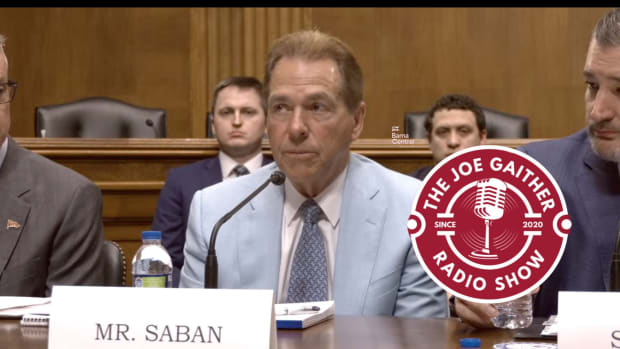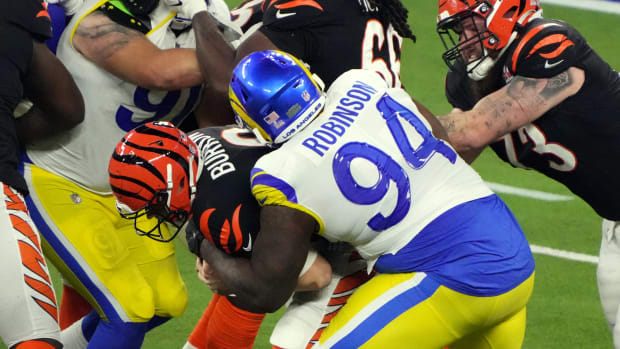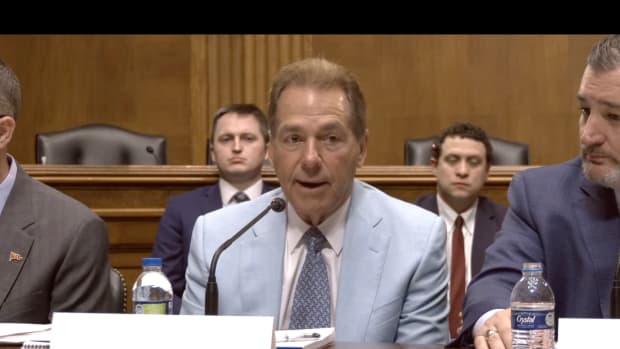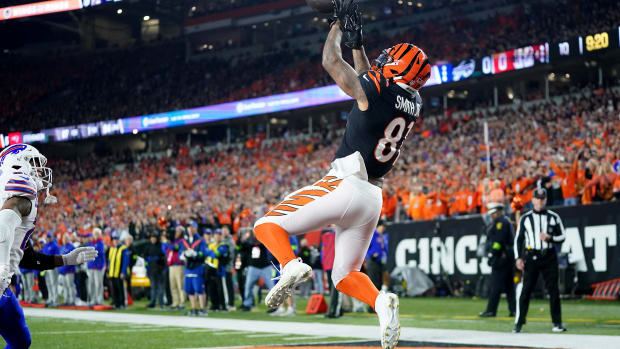How Will Bill O'Brien Stack Up Against Past Alabama Coordinators In His First Season?
Alabama just keeps reloading.
Year after year the Crimson Tide pulls in the top recruits from around the country and molds them into a championship-caliber team.
Heck, every recruiting class that signed to play at Alabama under head coach Nick Saban has a national championship ring to show off.
Those championships are due to Saban, obviously. He’s changed the culture at Alabama and collecting shiny hardware is just expected now.
What about the other coaches, though? What role do they play in Alabama’s success? Particularly the offensive coordinators, since Alabama replaces them like batteries. There have been seven offensive coordinators in Saban’s 14-year tenure in Tuscaloosa. That number moves to eight as Saban enters his 15th season.
Bill O’Brien is the latest offensive coordinator at Alabama. He takes over for Steve Sarkisian, who departed after two seasons to take the head coaching job at Texas.
The offensive coordinator and his philosophy play a big part of Alabama’s success. It has to or else the Tide wouldn’t have six national titles under Saban. Think about this – those five titles were won with four different offensive coordinators.
So, does it really doesn’t matter who is calling the plays so much as who is executing the plays. A quick look at the individual accolades Alabama players have garnered the past 15 years will verify that.
O’Brien will have some talented personnel to run his plays this year, too, and the former Houston Texans head coach with 20-plus years of coaching experience will surely have some challenges in 2021. But if history is any indication, he should fare well in his first year.
Here’s a look at how past offensive coordinators under Saban fared in their first season.
Major Applewhite
Year: 2007
Record: 7-6
With Applewhite in control of the offense in Saban’s first year, the Crimson Tide saw progress from the previous season from a statistical standpoint. That looked good on paper, but the product on the field, particularly the second half of the season, was tough to watch.
After a 6-2 start, the Crimson Tide offense lost its way, scoring just three touchdowns in four straight losses. Included in that stretch was a loss to Louisiana-Monroe at Bryant-Denny Stadium.
So, what went wrong? A multitude of excuses could be made, but one that sticks out was Applewhite’s experience. He was a graduate assistant with Texas from 2003-05 and was the offensive coordinator at Rice in 2006 before coming to Tuscaloosa.
Whatever the primary reason, it didn’t work out and Applewhite left for his alma mater, Texas, to coach running backs the following year.
Jim McElwain
Year: 2008
Record: 12-2
Everything changed in 2008, and not just the addition of McElwain as the coordinator. The Crimson Tide added the No. 1 receiver recruit in the country in Julio Jones.
But while Jones made an immediate impact with the passing game, Alabama’s run game turned the offense around. Under McElwain, the Crimson Tide ripped off 2,598 rushing yards with 32 touchdowns. The key component was a strong and physical offensive line.
The offense didn’t light up the scoreboard or appear near the top of the rankings in offensive categories in 2008, but the tough, physical style of play that matched the defense was just what Alabama needed.
McElwain, who had 20-plus years of coaching experience, was a change of pace from Applewhite, and the Tide won 10 straight games.
Of course, the rest of the story is that Alabama didn’t finish against Florida in a loss in the SEC title game, and then fell flat in the Sugar Bowl against Utah to end the season on a sour note.
Doug Nussmeier
Year: 2012
Record: 13-1
Alabama was coming off a national championship season when Nussmeier arrived. He was tasked with opening up the Crimson Tide passing game, which was his offensive philosophy at Washington the previous year. The Huskies’ Keith Price was No. 10 in the nation in passing in 2011. Alabama’s AJ McCarron was No. 24 that same year.
A year later under Nussmeier, McCarron moved to No. 1 in the nation with a 175.3 passer rating and No. 4 in yards per attempt (9.3). To top it all off, McCarron set a then-school record for touchdowns in a season (26) and led the Tide with four touchdowns against Notre Dame to deliver another national title.
The major impact Nussmeier had on UA’s offense was scoring. McCarron had 16 passing touchdowns in 2011 but threw 30 in 2012 under Nussmeier’s direction. Also, the Tide moved from 31st in the nation in total offense to 12th.
The run game wasn’t neglected by Nussmeier. It improved, too. He used Eddie Lacy and T.J. Yeldon efficiently to average 227 yards per game (16th nationally). That was a slight increase from 2011’s number of 214. Alabama running backs also scored 37 touchdowns in Nussmeier’s first year.
Lane Kiffin
Year: 2014
Record: 11-2
There are so many stories, incidents and quotes attributed to Kiffin in his three-year tenure at Alabama that you could write a book. We will stick to Year One and Kiffin’s success and failures on the field.
No one can question Kiffin’s abilities to coach an offense, and when he arrived in Tuscaloosa the Crimson Tide’s offense was better for it. Blake Sims, in his only season as the starting quarterback, threw for a then single-season UA record 3,487 yards with 28 touchdowns.
Like all Alabama offenses, balance was the main objective. Kiffin accomplished that with a beefed-up run game led Derrick Henry and T.J. Yeldon - both just missed having 1,000-yard seasons – and with playmaker Amari Cooper at receiver. He set then single-season records with 1,727 yards and 16 touchdowns in 2014.
Alabama had all the tools to win the national title. So, what happened? The offense basically laid an egg in the playoff semifinals against Ohio State. Leading 21-6 midway through the second quarter, the Crimson Tide produced just 54 yards on three straight drives while Ohio State scored on three straight drives. It also didn’t help that Sims threw a pick-6 in the process to put the Crimson Tide down by two touchdowns.
Kiffin took the brunt of the blame for the playoff loss. There were questions as to why Henry, who had the hot hand running the ball in the first quarter, wasn’t utilized more. He went nearly two quarters without a touch and still finished with 95 yards and a touchdown.
Brian Daboll
Year: 2017
Record: 13-1
We all know what happened here. The Crimson Tide won the national championship and a great deal of credit for that goes to Daboll. It was Nick Saban’s halftime decision to bench starting quarterback Jalen Hurts for true freshman Tua Tagovailoa that led to second-and-26 and history.
Alabama didn’t exactly set the world on fire with its offensive system in Daboll’s only season as coordinator. It was good enough to win with Hurts, and what he lacked in passing efficiency he made up for with his legs. The dual-threat QB passed for just over 2,000 yards with 17 touchdowns and was Alabama’s second-leading rusher with 855 yards and eight scores.
Alabama did score in bunches, seven times exceeding the 40-point plateau while hitting 50 points or more three times.
But twice in 2014 the Crimson Tide offense just didn’t have it, and in one of those instances lost the game – to Auburn. The other instance was in the first half against Georgia. Hurts was never comfortable in the pocket and couldn’t find his rhythm.
The offense clicked with the insertion of Tagovailoa at QB in the second half with the freshman making big play after big play, including the walk-off touchdown pass to DeVonta Smith.
Michael Locksley
Year: 2018
Record: 14-1
It was Tua time in 2018.
Locksley had one of the top quarterbacks in the country to work with and he got everything out of Tua Tagovailoa and more.
Alabama led the nation in total points (684) and was third in points per game (45.6). It was all Tua for Alabama during this record-setting season. As a sophomore he set a school record for single-season passing yards (3,966) and tossed a school-record 43 touchdowns.
The offense was a machine with Tagovailoa under center and the Crimson Tide steamrolled every opponent in its path in the regular season.
Alabama struggled twice late in the season, against Georgia in the SEC title game and vs. Clemson in the national title game. Alabama was bailed out by Jalen Hurts against Georgia, but nothing saved the Crimson Tide from Clemson.
Alabama’s offense looked pedestrian against the Tigers and nothing worked in a 44-16 rout.
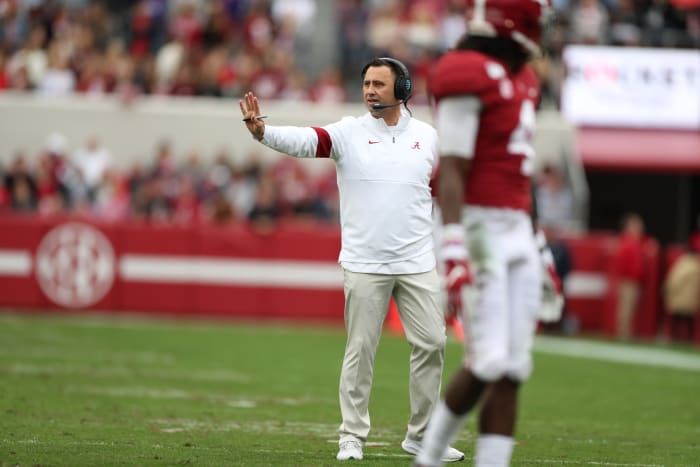
Steve Sarkisian was Alabama's offensive coordinator the past two seasons and helped the Crimson Tide win the 2020 national title in a record-breaking season.
Alabama Athletics
Steve Sarkisian
Year: 2019
Record: 11-2
Sarkisian was offensive coordinator in the 2016 season. However, we’re examining at a full season of work and not just one game – a loss to Clemson in the national title game.
When Sarkisian returned to Tuscaloosa following a two-year stint with the Atlanta Falcons, he had all the weapons an offensive coach could ask for. Tagovailoa was back at quarterback with the three-headed monster at receiver – Jerry Jeudy, Henry Ruggs III and DeVonta Smith. Throw in Jaylen Waddle and it was a defensive coach’s nightmare.
This was a season of “what if” for Sarkisian and the Tide. Tagovailoa, coming off injures from the previous season and not exactly 100 percent, sustained a season-ending hip injury against Mississippi State.
While backup Mac Jones filled in nicely, there was always the sense that the season would have played out differently with a healthy Tagovailoa.
Tagovailoa and Jones combined for nearly 4,500 passing yards and 47 touchdowns, while Smith and Jeudy topped the 1,000-yard receiving mark.
It was a near miss for Alabama in 2019, but that just set the stage for the following year and a record-breaking season unlike any other in Crimson Tide history.


